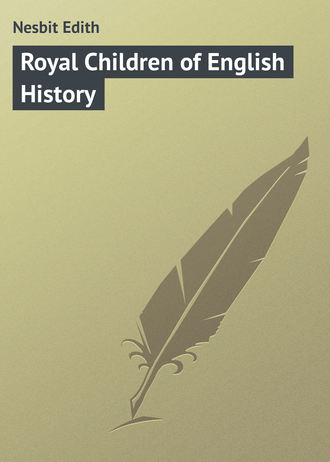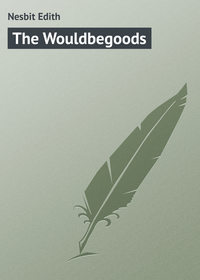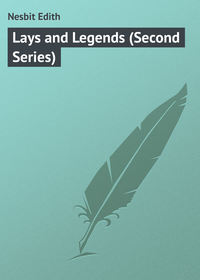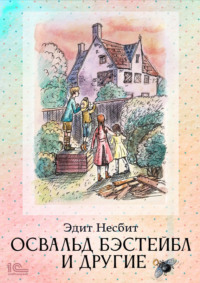 полная версия
полная версияRoyal Children of English History
At fourteen a page became a squire. He helped his lord to put on his armour, carried his shield to battle, cleaned and polished his lord's armour and sharpened his sword, and he was allowed to wear silver spurs instead of iron ones, such as the common people wore.
When he was considered worthy to become a knight he went through a ceremony which dedicated him to the service of God.
The day before he was to become a knight the young man stripped and bathed. Then he put on a white tunic – the white as a promise of purity; a red robe – the red meant the blood he was to shed in fighting for the right; and he put on a black doublet (which is a sort of jacket), and this was black in token of death, of which a knight was never to be afraid. Then he went into the church, and there he spent the night in prayer. He heard the priests singing their chant in the darkness of the big church, and he thought of his sins, and steadfastly purposed to lead a new life. In the morning he confessed his sins, walked up to the altar, laid down his belt and sword, and then knelt at the foot of the altar steps. He received the Holy Communion, and then the lord who was to make him a knight gave him the accolade – three strokes on the back of the bare neck with the flat side of the sword – and said:
"In the name of Saint George I make thee a knight," – and bade him take back his sword – "in the name of God and Saint George, and use it like a true knight as a terror and punishment for evil-doers, and a defence for widows and orphans, and the poor, and the oppressed, and the priests – the servants of God."
The priests and the ladies came round him and put on his gilt spurs, and his coat of mail, and his breastplate, and armpieces, and gauntlets, and took the sword and girded it on him. Then the young man swore to be faithful to God, the King, and woman; his squire brought him his helmet, and his horse's shoes rang on the church pavement and under the tall arches as his squire led the charger up the aisle. In the presence of priests, and knights, and ladies assembled, the young knight sprang upon his horse and caracoled before the altar, brandishing his lance and his sword. And then away to do the good work he was sworn to.
Many, of course, forgot their promises and broke their vows, but in those wild times many a rough man was made gentle, many a cruel man less cruel, and many a faint-hearted one made bold by the noble thoughts from which the idea of chivalry sprang.
Now, you know, England is governed by the Queen and Parliament. But in those old days England was ruled by the King and by such nobles as had money and strength enough to be able to rule by force. These nobles were indeed a terror to the people. They lived in strong, stoutly-built castles, with a great moat or ditch round them, and having always many retainers and armed servants, they were often able to resist the King himself. It was the growing power and riches of the King which they most dreaded, for he only could do them harm. It was then for their own sakes – to guard their own persons, to protect their own property against the King – rather than from any desire to help the people, that the barons resisted first John and then Henry.
But among them was a noble, unselfish man, who loved his fellow countrymen, and who saw, that to make people rich, and happy, and prosperous, they must be allowed to share in the government of the country in which they live. This noble Englishman, Simon de Montfort, was called the great Earl, and it was he who headed the resistance to Henry the Third, when that King tried to escape from keeping the promises contained in the Great Charter which he had bound himself to obey.
The resistance grew so strong that at last there was war in England. At the Battle of Lewes, Simon de Montfort defeated Henry and took him prisoner, and with him was his son, Prince Edward. Then at last a Parliament was called. Two knights were sent to it from each county, and from every town two citizens. It was chiefly to get these towns represented in Parliament that the great Earl opposed the King.
Prince Edward was very anxious to escape and fight another battle for his father. So he pretended to be very ill. When he got better he asked his gaolers to let him go out riding for the benefit of his health. They agreed, but of course, they sent a guard of soldiers out with him to see that he did not escape. Prince Edward rode out for several days with them and never even tried to get away. But one day he begged them to ride races with each other, while he looked on. They did so, and when their horses were quite tired, he shouted, "I have long enough enjoyed the pleasure of your company, gentlemen, and I bid you good-day," put spurs to his horse, and was soon out of their reach. His friend, the Earl of Gloucester, joined him, and they soon raised an army and defeated the great Earl at Evesham.
A.D. 1265"Let us commend our souls to God," said Simon, as Prince Edward and his men came down upon him and the little band of knights who stood by his side. One by one the knights fell, till Simon only was left. He hacked his way through his foes, and had nearly escaped when his horse was brought to the ground, and a death wound was given him from behind. "It is God's grace," he said, and died. But though the leader died, the work was done, and a Parliament established in England.
Some of the priests in England had grown very wicked and greedy. They neglected their duties and thought only of feasting and making themselves comfortable. But some good monks came over from Rome, and determined to try to show the English priests what a Christian's duty was. They made a vow to be poor, and to deny themselves everything, except just enough food to keep body and soul together. They would not even have books at first, but spent all the money they could collect on the poor. They nursed the sick and helped the unfortunate. They would not wear pretty clothes or beautiful vestments, but were dressed in plain grey or black serge, with a rope round the waist, and bare feet. Although they were foreigners and could speak but little English, they encouraged people to write in the English language instead of in Latin or French.
It was a favourite dream of the early English and French kings to take Jerusalem and the Holy Land from the hands of the Saracens, and to let Christians be the guardians of the place where Christ lived and died. To do this they were constantly making war on the Saracens, and these wars were called Crusades, and the knights who went to them Crusaders. Crusaders carried a red cross on their banners and on their shields. The Saracens' banners and shields had a crescent like a new moon. For two hundred years this fighting went on, and the last of our English princes to take part in it was Prince Edward. He had only three hundred knights with him, and was not able to attack Jerusalem, because he could not get together more than seven thousand men. His knights went on pilgrimage to Jerusalem, but he stayed in his camp at Acre. One day a messenger came into his tent with letters, and while he was reading them the wicked messenger stabbed him. He had been sent to do so by the Saracens, because they were afraid of this brave prince. The prince caught the blow on his arm, and kicked the messenger to the ground, but the man rose and rushed at him again with the knife. The dagger just grazed the prince's forehead, and seizing a wooden footstool Prince Edward dashed out the messenger's brains. His wife, the Princess Eleanor, was afraid the dagger was poisoned. So she sucked the blood from his wound with her own lips, and so most likely saved his life. But he was very ill in spite of this, and England nearly lost one of her best and bravest princes.
a. d. 1272As soon as he was well enough to travel, he set out for England, and on the way he was met with the sad news that his father and two of his children were dead. So he became King of England, and he was the father of the first Prince of Wales.
The First Prince of Wales
THERE were Welsh princes long before there were English kings, and the Welsh princes could not bear to be subject to the kings of England. So they were always fighting to get back their independence. But the English kings could not let them be free as they wished, because England could never have been safe with an independent kingdom so close to her. So there were constant wars between the two countries, and sometimes the fortune of battle went one way and sometimes the other.
But at last the Welsh Prince Llewellyn was killed. He had gone to the south of Wales to cheer up his subjects there, and he had crossed the river Wye into England, when a small band of English knights came up. A young knight named Adam Frankton met with a Welsh chief as he came out of a barn to join the Welsh army. Frankton at once attacked him, and after a struggle, wounded the Welsh chief to death. Then he rode on to battle, and when he came back he tried to find out what had become of the Welshman. He heard that he was already dead, and then they found that the dead man was the great Welsh Prince Llewellyn. His head was taken off and sent to London, where it was placed on the battlements of the Tower and crowned, in scorn, with ivy. This was because an old Welsh magician, years before, had said that when English money became round, the Welsh princes should be crowned in London. And money had become round in this way: —
Before this there were silver pennies, and when anyone wanted a half-penny, he chopped the silver penny in two, and if he wanted a farthing he chopped the silver penny in four, so that money was all sorts of queer shapes. But Edward the First had caused round copper half-pennies and farthings to be made, and when the Welsh prince had heard of this he had believed that the old magician's words were coming true, and that he should defeat Edward and become king of England himself. Instead of this, the poor man's head was cut off, and, in mockery of his hopes and dreams, they crowned the poor dead head with the wreath of ivy.
Now the Welsh wanted another prince, and King Edward said: "If you will submit to me and not fight any more, you shall have a prince who was born in Wales, can speak never a word of English, and never did wrong to man, woman, or child." The Welsh people agreed that if they could have such a prince as that, they would be contented and quiet, and give up fighting. And so one day the leaders of the Welsh met King Edward at his castle in Caernarvon and asked for the Prince he had promised them, and he came out of his castle with his little son, who had only been born a week before, in his arms.
"Here is your Prince," he said, holding up the little baby. "He was born in Wales, he cannot speak a word of English, and he has never done harm to man, woman or child."
Instead of being angry at the trick the king had played them, the Welsh people were very pleased. Welsh nurses took care of the baby, so that he really did learn to speak in Welsh before he could speak in English. And the Welsh were so pleased with their baby king that from that time Edward the First had no more trouble with them.
There are many stories told of this prince's boldness as a child. He promised them to grow up as brave as his father, and it would have been better for him if he had done so. He was always very fond of hunting, and once when he was quite young, he and his servants were hunting the deer. His servants lost the trace of the deer, and presently, when they reined up their horses, they found that the young prince was no longer with them. They looked everywhere for him, very frightened lest he should have fallen into the hands of robbers; and at last they heard a horn blown in the forest. They followed the sound of it and presently found that the young prince had seen which way the deer went, and had followed it and killed it all by himself.
Now King Edward the First had great trouble with his Scotch nobles, and many were the battles he fought with them, until at last he forced the Scottish king Balliol to declare himself his vassal, and he became the over-lord of Scotland. But there arose a brave Scot named William Wallace, who longed to see his country free from England, and he drove the English back, and again and again he beat them.
But in a few years Edward got together another army, and leading them into Scotland he beat the Scots and took Wallace prisoner. Wallace was tried and found guilty of treason, and when he had been beheaded, they crowned his head with laurel and placed it on London Bridge, for all the passers-by, by road or river, to see.
a. d. 1305Then two men claimed the Scottish crown, Robert Bruce and John, who was called the Red Comyn. They were jealous of each other, and Bruce thought that Comyn had betrayed him. They met in a church to have an explanation.
"You are a traitor," said Bruce.
"You lie," said Comyn.
And Bruce in a fury struck at him with his dagger, and then, filled with horror, rushed from the church. "To horse, to horse," he cried. One of his attendants, named Kirkpatrick, asked him what was the matter.
"I doubt," said Bruce, "that I have slain the Red Comyn."
"You doubt!" said Kirkpatrick. "I will make sure."
So saying, he hurried back into the church and killed the wounded man.
And now the task of defending Scotland against Edward was left to Robert Bruce. King Edward was so angry when he heard of this murder, that at the feast, when his son was made a knight, he swore over the swan, which was the chief dish and which was the emblem of truth and constancy, that he would never rest two nights in the same place till he had chastised the Scots. And for some time the Scots and English were at bitter war, and when King Edward died, he made his son promise to go on fighting.
a. d. 1307But Edward the Second was not a man like his father. He was more like his grandfather Henry the Third, caring for pretty colours and pretty things, rich clothes, rich feasts, rich jewels, and surrounding himself with worthless favourites. Robert Bruce said he was more afraid of the dead bones of Edward the First than of the living body of Edward of Caernarvon, and that it was easier to win a kingdom from his son than a foot of land from the father. Gradually the castles the English had taken in Scotland were won back from them. For twenty years the English had held the Castle of Edinburgh, and at the end of that time, Randolph, a Scottish noble, came to besiege it.
The siege was long, and the brave English showed no signs of giving in. Randolph was told that it was possible to climb up the south face of the rock on which the castle stood, and steep as the rock was, Randolph and some others began to climb it one dark night. When they were part of the way up, and close to the wall of the castle, they heard a soldier above them cry out – "Away, I see you," and down came stone after stone. Had many more been thrown Randolph and his companions must have been dashed to the ground and killed, for it was only on a very narrow ledge that they had found a footing. But the soldier was only in joke, trying to frighten his fellows. He had not really seen them at all, and he passed on. When all was quiet again, the daring Scots climbed up till they reached the top of the wall, and when they had fixed a rope ladder the rest of their men came up. Then they fell upon the men of the garrison and killed them, and the castle was taken by the Scots.
a. d. 1314But a greater loss awaited the English. Edward led an English army to battle in Scotland; and at Bannockburn they met the force of the Scots king. They fought till the field was slippery with blood, and covered with broken armour and lances and arrows. Then at the last, as the English began to waver, Bruce charged down on them with more soldiers and utterly routed them. Edward with difficulty saved his life, and throughout England there were bitter lamentings at the loss and shame the country had suffered. Scotland was free from the English yoke, and of all the great conquests the first Edward had won, only Berwick-on-Tweed remained to the English.
Edward II. was never loved by his subjects. He made favourites of silly and wicked persons, and so gave much offence to good folk. He was wasteful and extravagant, and did not even try to govern the country wisely and well, while his favourites made themselves hated more and more by their dishonesty and wickedness. The last of his favourites was named Despenser, and he was as much hated by the Queen Isabella as by the lords and people of England. Despenser not only made himself hated by the queen, but he managed also to make her dislike her husband, the king, with whom she had long been on unfriendly terms. At last Isabella, disgusted with her husband and his favourite, ran away to France, and there, with the help of the Count of Hainault and other friends in England, she raised an army and attacked and defeated her husband and his favourite. The young Despenser was hanged on a gibbet fifty feet high, and a Parliament was called to decide what should be done with the king.
The Parliament declared its right to make or unmake kings, and ordered that Edward should not be king any more. Some members went to Edward at Kenilworth to tell him what they had decided, and Edward clad in a plain black gown, received them and quietly promised to be king no more. Then he was taken to Berkeley Castle, and a few months after the people learned that he was dead.
There has always been much doubt whether he died a natural death or was murdered. The Bishop of Hereford, who had always been on the queen's side, is said to have sent to two wicked men the following message written in Latin – "Edwardum occidere nolite timere bonum est." Now this message had two meanings according to the way the stops were put in. The first was – "Be unwilling to fear to kill Edward – it is good." The other was – "Be unwilling to kill Edward – it is good to fear."
So you see that, if this message fell into anyone's hands for whom it was not intended, the bishop would have been able to say he meant to warn people not to kill the king, while Gurney and Maltravers, who received the message, could say that the paper was an order to kill him. The story goes, that they came to the castle and there found the poor king in a dungeon. He was standing in mire and puddle, and, although he was a king, they gave him only bread and water. Then he thought of his former greatness and how brave and gallant a show he had made as a knight, and he cried out —
"Tell Isabel, the queen, I looked not thusWhen for her sake I ran at tilt in FranceAnd there unhorsed the Duke of Cleremont."a. d. 1327He was too weak to resist these wicked men, and they had no mercy in their hearts, but murdered him.
Edward the Black Prince
a. d. 1340THE name of Edward the Black Prince will always be remembered with love and admiration by all young Englishmen, because he was by all accounts a very brave, gallant, and courteous prince, feared by his foes and by his friends beloved. His father, Edward the Third, had not given up his hopes of regaining his lost possessions in France, so he spent two long years in getting together money and ships and an army. He fought the French fleet near Sluys. Both sides fought fiercely, and at last the English won. The French had thought that they were quite sure to get the best of it, and they were afraid to tell the King of France how the English had beaten them, for hundreds of the French had been either killed or been forced to jump into the sea to escape the swords of the English.
Now, at this time every king kept a jester to make jokes and amuse him and his friends at their feasts, and the jester was a privileged person, who could say anything he liked. So now they told the jester of the King of France that he must tell the king the bad news, because he could say what he liked and no one would punish him for it. So the jester said —
"Oh! what dastardly cowards the English are!"
"How so?" said the king, who expected to hear that the cowardly English had been driven away by his men.
"Because," answered the jester, "they have not jumped into the sea as our brave men had to do."
So then the king asked him what he meant, and then the courtiers came forward and told the sad story of the English victory.
Then Edward besieged a town called Tournay, but he had not enough money to get provisions for his men, so he had to make friends with the king of France for a little while and go back to England.
Six years later he pawned his crown and his queen's jewels, and at last got together enough money to go and fight with the French again. He landed at La Hogue, and as he landed he fell so violently that his nose began to bleed.
"Oh, this is a bad sign," said his courtiers, "that your first step on French soil should be a fall."
"Not so," said the king. "It is a good sign. It shows that the land desires me: so she takes me close to her."
He had thirty-two thousand men with him, and his son, the Black Prince. Some say he was called the Black Prince because he wore black armour, but others say it was because he made himself as great a terror to the French as a black night is to foolish children.
Edward marched towards the French and the French marched to meet him, and as they marched they broke down all the bridges, so that the English could not advance by them. But Edward had made up his mind to get across the river Seine and fight with his enemies; and he was no more to be stopped by the water than a dog would have been who wanted to get over to the other side to fight another dog. He got a poor man to show him a place where the river was shallow at low tide, and there he plunged into the river, crying, "Let him who loves me follow me," and the whole army followed and got safely to the other side.
Edward arranged his soldiers well, and went himself to the top of a little hill where there was a windmill. From this he could see everything that went on. The French had a far larger army than the English, and when they came in sight of Edward's army and saw how well placed it was, the wiser Frenchmen said, "Do not let us fight them to-day, for our men and horses are tired. Let us wait for to-morrow and then we can drive them back." So the foremost of the French army turned back, but those behind were discontented and thought the fighting had begun and that they had not had a chance. So they pushed forward till the whole French army was close to the English.
a. d. 1346King Edward had made all his soldiers sit on the grass and eat and drink. Mounted on his horse he rode among them telling them to be brave, for that they were now going to win a glorious victory and cover themselves with eternal glory. At three in the afternoon the first French soldiers came face to face with the Englishmen, and the battle began. Some soldiers from Genoa who had been paid to fight for the French king, said they did not want to fight, they were too tired and could not fight as good soldiers should, but the men behind pressed them on and they were beaten. A heavy rain fell, with thunder, and a great flight of crows hovered in the air over all the battalions, making a loud noise. Shortly afterwards it cleared up and the sun shone very bright. But the French had it in their faces and the English at their backs.
When the Genoese drew near, they approached the English with a loud noise to frighten them; but the English remained quite quiet, and did not seem to attend to it. They then set up a second shout and advanced a little forward. The English never moved. Still they hooted a third time, and advanced with their crossbows presented and began to shoot. The English archers then moved a step forward and shot their arrows with such force and quickness that it seemed as if it snowed. The fight raged furiously, and presently a knight came galloping up to the windmill and begged the king to send help to his son, the Black Prince, as he was sore pressed.
"Is my son in danger of his life?" said the king.
"No, thank God," returned the knight, "but in great need of your help."
Then the king answered: "Return to them that sent you and say that I command them to let the boy win his spurs, for I am determined that, if it please God, all the glory of this day shall be given to him and to those to whose care I have entrusted him."
This message cheered the Prince mightily, and he and the English won the battle of Creçy.









